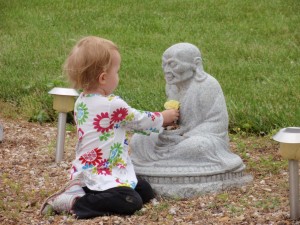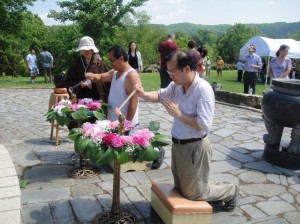Walk to Feed the Hungry
 “The gift of food is the gift of life.” — the Buddha
“The gift of food is the gift of life.” — the Buddha
Bhikkhu Bodhi, highly respected scholar, teacher and Founder/Chairperson of Buddhist Global Relief will lead a Walk to Feed the Hungry around the perimeter of the Gateway Arch this coming Sunday, June 9, beginning at 1:00 pm.
Please join us!
Buddhist Global Relief’s mission statement:
Our mission is to combat chronic hunger and malnutrition. Bearing in mind the Buddha’s statement that “hunger is the worst kind of illness,” we sponsor projects that promote hunger relief for poor communities around the world. We pursue our mission by:
* Providing direct food aid to people afflicted by hunger and malnutrition
* Helping develop better long-term method of sustainable food production and management appropriate to the cultures and traditions of the beneficiaries
* Promoting the eduction of girls and women, so essential in the struggle against poverty and malnutrition
* Giving women an opportunity to start right livelihood projects to support their families
We also seek to raise awareness of global hunger and advocate for an international food system that exemplifies social justice and conduces to ecological sustainability.
(image from: A whole World, by Couprie and Louchard)
Back at the Marketplace
More from Dancing with Life, by Phillip Moffitt:
 A clear example of this understanding [that Finding Liberation from Suffering is Not the Same as Abandoning the Word] can be found in the Zen Oxherding pictures by Kakuan. This series of 10 drawings begins with a picture of a man having a sense that something is missing in his life, which is symbolized by the ox. Next he sees the footprint of the ox, which awakens inspiration in him to become his true nature. From there he searches until he finds the ox, develops a relationship to it, and then discovers its emptiness, i.e., cessation.
A clear example of this understanding [that Finding Liberation from Suffering is Not the Same as Abandoning the Word] can be found in the Zen Oxherding pictures by Kakuan. This series of 10 drawings begins with a picture of a man having a sense that something is missing in his life, which is symbolized by the ox. Next he sees the footprint of the ox, which awakens inspiration in him to become his true nature. From there he searches until he finds the ox, develops a relationship to it, and then discovers its emptiness, i.e., cessation.
But the series doesn’t end with emptiness. In the last picture the man returns to the marketplace with a beatific smile on his face, and the text says that he ‘returns to the marketplace showing no sign of holiness, but if he touches the dead trees they come into full bloom.’
When you are around someone who has deep experience in cessation, it is like the description of the ox herder returning to the marketplace. Such a person resides in a feeling of freedom from attachment; they know that they know, thus they are able to freely participate in life. You feel assured, relaxed, even a little blessed being in their presence, as though the insight they have realized brings out the best in you, too.
It’s true. This is exactly how I have felt when I’ve been around Phillip, as well as Mirabai and many, many of the other teachers at Spirit Rock and IMS.
(image by: Laurie Smith, from Local Flavors: Cooking and Eating from America’s Farmers’ Markets)
Fully Available and Responsive
It’s been a while since I’ve quoted from Dancing with Life, by Phillip Moffitt. I’m reading it again with one of the Monday night KM groups, and it just keeps speaking to me more and more clearly every time I pick it up.
 For example, this from the section titled: Finding Liberation from Suffering is Not the Same as Abandoning the World (p. 191 in the hardback edition)
For example, this from the section titled: Finding Liberation from Suffering is Not the Same as Abandoning the World (p. 191 in the hardback edition)
The knowing of cessation [from suffering] does not necessarily mean that you retreat from the world. The Buddha certainly didn’t just sit in bliss for years after his full realization of cessation [enlightenment]. Instead, he spent 45 years teaching and dealing with the mundane problems of living in a community, including jealousy from other teachers and accusations and resentments from the lay community.
The same is true for you; you are not practicing cessation in order to be somewhere other than where you are. Just the opposite is true; Knowing cessation means that, for the first time ever, you are able to be just where you are in this very moment, fully available and responsive.
… In the Zen tradition, it is taught: “Before enlightenment chop wood and carry water, and after enlightenment, chop wood and carry water.” Life continues to be an ever-chaning stream of moments, but how you perceive and relate to the stream changes. The difference is that because you now know the essential insights, you are able to live wisely and be in harmony with life in this realm, however it manifests. You do what needs to be done without taking it personally or being attached to results of actions.
Or as Ajahn Sumedho says, “We do things because that is the right thing to be doing at this time and in this place rather than out of a sense of personal ambition or fear of failure.”
(image from: A Whole World, by Couprie and Louchard)
Happy Birthday Buddha
I didn’t take any pictures at Sunday’s Buddha Birthday Party at MABA, but I’m glad someone else did. There are TONS of them posted here.
Buddha’s Birthday Party
Unfortunately, Bhikkhu Bodhi wasn’t able to be at the Buddha’s Birthday Celebration (Vesak Day) on Sunday at Mid-America Buddhist Association (MABA), but the day was lovely nonetheless. I was enjoying the ceremony too much to take photos…but here are some from last year’s celebration (on MABA’s website).
NOTE: Bhikkhu Bodhi is still planning to lead the Walk to Feed the Hungry on Sunday, June 9 and will give a Dharma Talk at the Pure Mind Center in University City on Tuesday, June 11. Check the Dharma Town Coming Attractions page for more info.
 This is the Buddha statue, getting a celebratory bath.
This is the Buddha statue, getting a celebratory bath.
 Here’s the nice, clean statue looking out over the land.
Here’s the nice, clean statue looking out over the land.
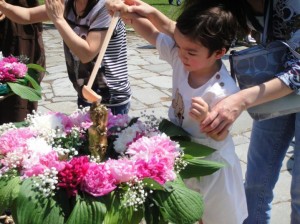 This is the ritual bathing (of the little baby Buddha statues) we all participated in.
This is the ritual bathing (of the little baby Buddha statues) we all participated in.
Here’s more of the washing ritual.
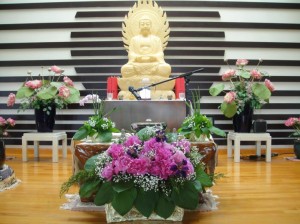 Here is the alter in the meditation hall.
Here is the alter in the meditation hall.
 Here’s the hall while a dharma talk is going on.
Here’s the hall while a dharma talk is going on.
We’re done.
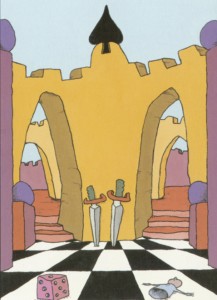 The last link in the chain of Transcendent Dependent Arising is Knowledge of Destruction of the Taints (asavvakkhaye nana).
The last link in the chain of Transcendent Dependent Arising is Knowledge of Destruction of the Taints (asavvakkhaye nana).
Which basically means that not only does the calm and collected mind know that all things are impermanent, unable to satisfy deeply and are without an inherent existence that can be called a “self”….the mind knows that it knows! So it naturally abandons grasping for things to be other than they are. There is no more trying to find lasting happiness is things that can not provide it.
The struggle is over.
The mind is free from the taints (obscuring factors) that caused the greediness, hatred and delusion.
The work is done.
(image from: Phantasmagoric Theater Tarot)
Free At Last!
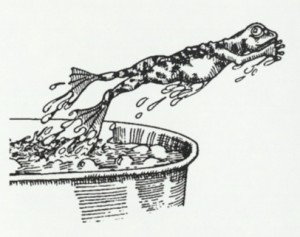 The next link on the chain of Transcendent Dependent Arising is Emancipation (vimutti).
The next link on the chain of Transcendent Dependent Arising is Emancipation (vimutti).
The mind has seen the truth (yathabhuta…) of the way things are (that everything is impermanent, incapable of satisfying at the deepest level, and empty of an inherent essence that can be called a “self”).
Then the illusion that the world is different than this can no longer be sustained (nibbida) and the relentless grasping after things and experiences (in an attempt to find lasting happiness from that which is fundamentally incapable of providing it) will naturally lose its appeal (virago)….and we are FREE! (vimutti)
(image from: Creative Whack Pack)
This Will Not Satisfy
 When the mind has seen through — and let go of — the illusion that lasting satisfaction can be found in things that are constantly changing, the result is Dispassion (virago) toward “worldly” phenomena.
When the mind has seen through — and let go of — the illusion that lasting satisfaction can be found in things that are constantly changing, the result is Dispassion (virago) toward “worldly” phenomena.
This is not Depression. Or Indifference. It’s not: “who cares, it’s all impermanent anyway”….which is just another form of hatred and aversion. It’s more the feeling that things are inherently Un-enticing, Un-captivating, Un-satisfying in the long run. And therefore: Able To Be Let Go Of.
Which might not sound all that great. But this is what leads to profound freedom and ease.
More on that tomorrow.
(image from: Wanderlust by Troy M. Litten)
The Spell Is Broken
 Disenchantment (nibbida) is the next link in the chain of Transcendent Dependent Arising. When the Calm (passaddhi) and Contented (sukkha) mind becomes Stable enough (samadhi) to really See and Understand the Fundamental Nature of Things (yathabhuta…), then the illusion of our everyday world can finally be seen through…and the spell is broken.
Disenchantment (nibbida) is the next link in the chain of Transcendent Dependent Arising. When the Calm (passaddhi) and Contented (sukkha) mind becomes Stable enough (samadhi) to really See and Understand the Fundamental Nature of Things (yathabhuta…), then the illusion of our everyday world can finally be seen through…and the spell is broken.
What illusion?
The illusion that there is anything at all that is unchanging, that can provide lasting satisfaction, or that has an eternal essence that is its “self.”
Which sounds like really bad news.
But it’s not!
Stay tuned.
(image from: Phantasmagoric Theater Tarot)
Seeing Things As They Are
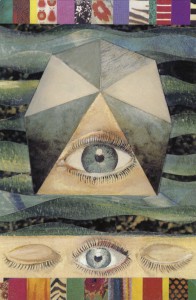 The next link on the chain of Transcendent Dependent Arising is called Knowledge and Vision of Things As They Are (yathabhutananadassana). Carol Wilson prefers the translation: Things As They Have Come To Be, which I like too, because it reinforces the understanding that everything is constantly changing, evolving, coming-into-being.
The next link on the chain of Transcendent Dependent Arising is called Knowledge and Vision of Things As They Are (yathabhutananadassana). Carol Wilson prefers the translation: Things As They Have Come To Be, which I like too, because it reinforces the understanding that everything is constantly changing, evolving, coming-into-being.
This “Knowledge and Vision” is what Insight (vipassana) is all about. When the mind is calm (passaddhi) and contented (sukha), it gets profoundly still (samadhi). When this happens, it’s possible to actually see into the fundamental nature of all things: that they are inherently unstable (anicca), unable to provide lasting satisfaction (dukkha), and without an eternal essence (anatta).

